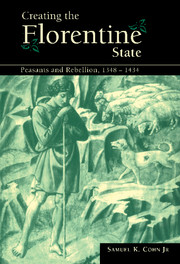Book contents
- Frontmatter
- Contents
- List of illustrations
- List of tables
- Acknowledgements
- Note on citations, dates, and measures
- Introduction
- PART I CULTURE, DEMOGRAPHY, AND FISCALITY
- PART II PEASANT PROTEST IN THE MOUNTAINS: THREE VIEWS
- PART III GOVERNMENTAL CLEMENCY AND THE HINTERLAND
- Conclusion
- Appendix 1 Regression models: wealth, migration, and taxes
- Appendix 2 Tax coefficients, 1354–1423
- Bibliography
- Index
Introduction
Published online by Cambridge University Press: 07 August 2009
- Frontmatter
- Contents
- List of illustrations
- List of tables
- Acknowledgements
- Note on citations, dates, and measures
- Introduction
- PART I CULTURE, DEMOGRAPHY, AND FISCALITY
- PART II PEASANT PROTEST IN THE MOUNTAINS: THREE VIEWS
- PART III GOVERNMENTAL CLEMENCY AND THE HINTERLAND
- Conclusion
- Appendix 1 Regression models: wealth, migration, and taxes
- Appendix 2 Tax coefficients, 1354–1423
- Bibliography
- Index
Summary
The transition from the late-medieval to the Renaissance state in Florence has had a long and venerable historiography, spanning the fields of political thought and consciousness to public finance. For Francesco Guicciardini (1483–1540), after a brief mention of the revolt of the Ciompi, it was Cosimo de' Medici's return from exile and rise to power in 1434 that began the “ rivoluzione dello stato” and where his Storia fiorentina truly begins. The Medici's importance in the rise of a new Florentine state held sway until the Second World War, when historians began to push its critical moment earlier, even as far back as the creation of its funded state debt, the Monte, in 1345. Most historians now mark the rise of a new state sometime between the government of the Albizzi's rise to power in 1393 and 1411. More than Cosimo il Vecchio, Maso degli Albizzi is seen as the innovator of what historians have called the Renaissance, territorial, regional, or even the modern state. Recent historians of the Medici also now see this dynasty's rise to power more as continuity than change, whether the subject is the mechanisms of the Florentine constitution or the social networks of political patronage.
Information
- Type
- Chapter
- Information
- Creating the Florentine StatePeasants and Rebellion, 1348–1434, pp. 1 - 10Publisher: Cambridge University PressPrint publication year: 1999
